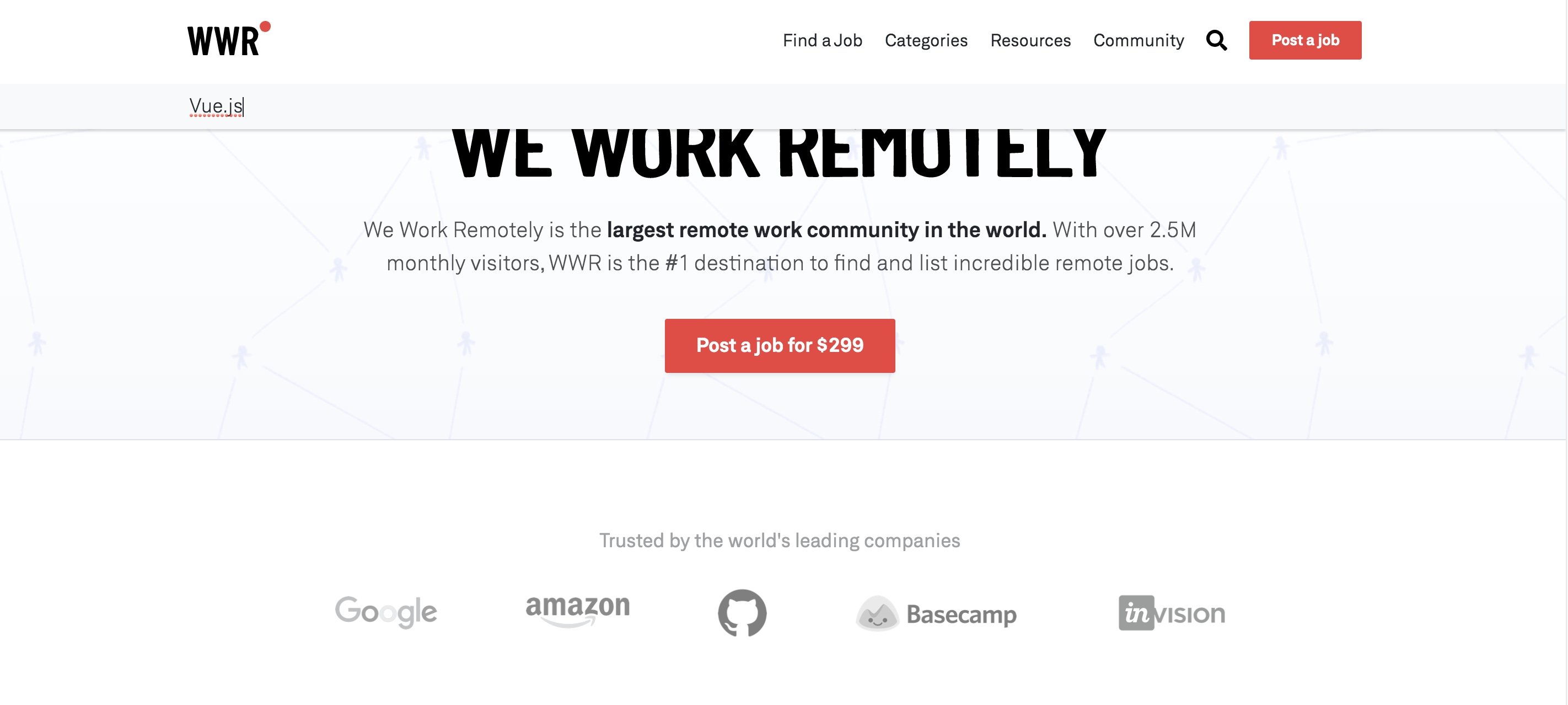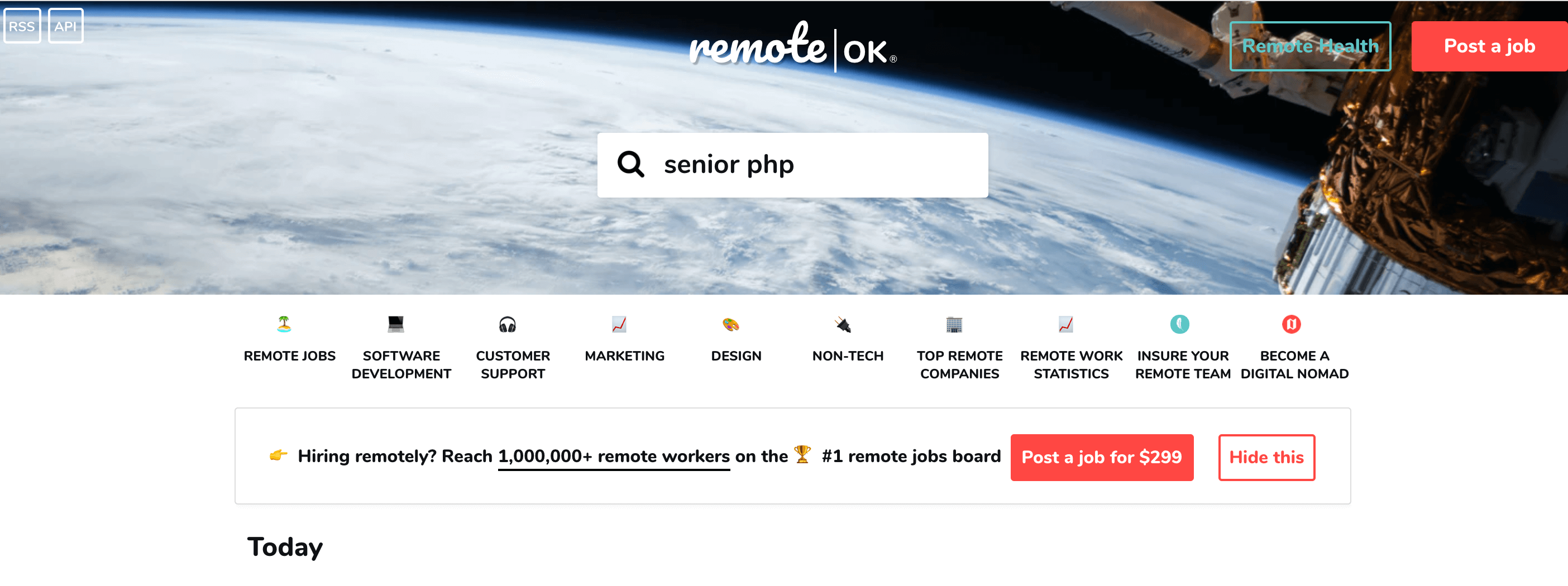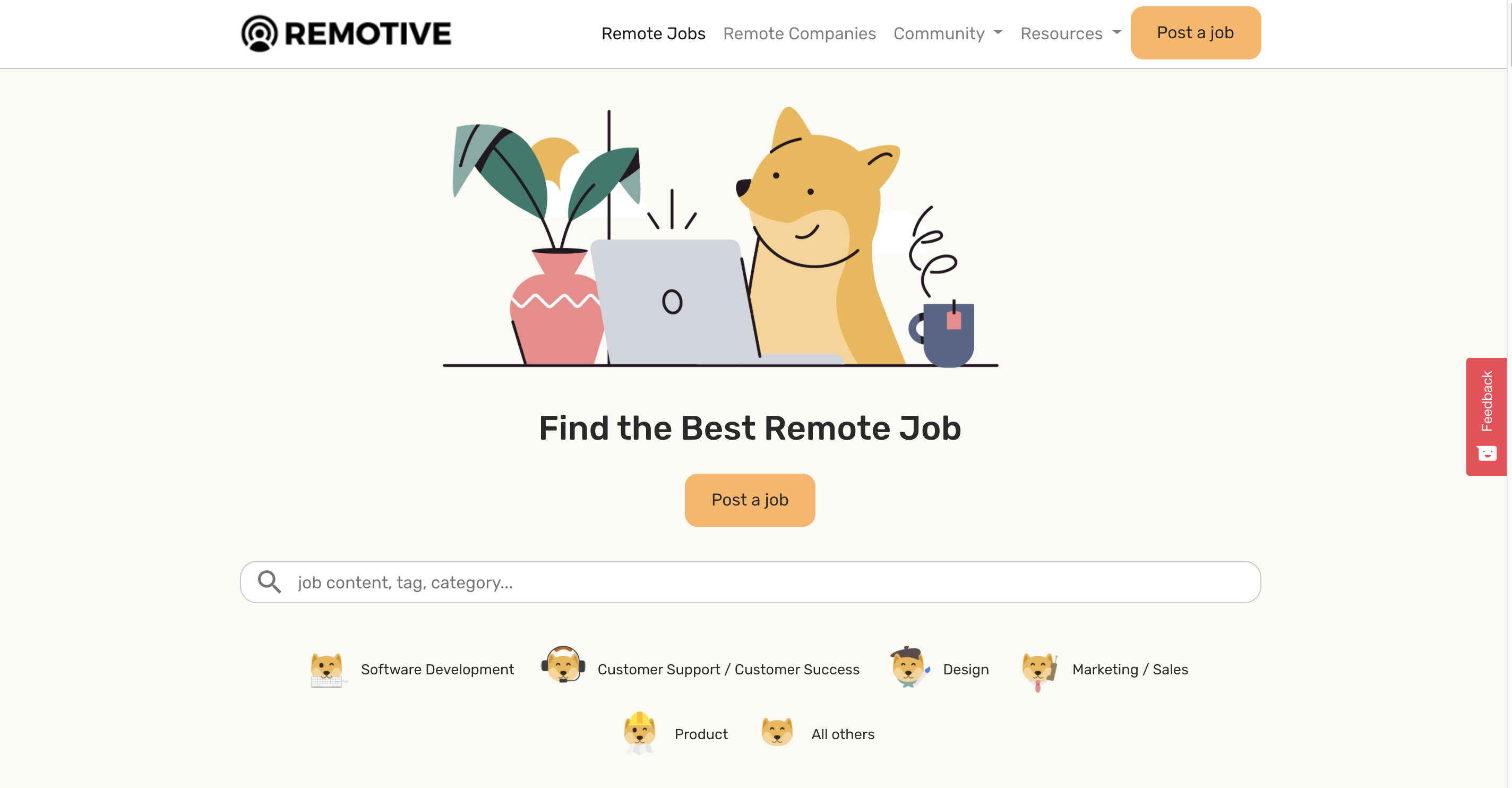Working from home is becoming more prevalent day by day and for many developers it almost feels natural to transition to a remote position at some point in their career. However, the process of switching is not as straightforward as many people think since in reality finding a decent full-time remote job works different from getting a traditional office based one in your city or area you live in.
It has a few specific angles you need to take into account and requires more research and preparation. What prevents many engineers from making the leap into remote work successfully is a combination of lack of information and an approach that is more applicable for getting a standard job.
Hence, I’ve summarized my knowledge and experience into a concise step by step guide which also helped me land a remote job at an amazing startup. While that doesn’t guarantee the same results for you, I firmly believe it will make your leap into remote work a lot smoother, it’ll save you time and spare you a ton of stress.
Learn How To Get a Remote Developer Job: Step by Step
- Set realistic expectations for your remote job search goals
- Select remote job platforms
- Avoid playing the numbers game with applications
- Filter job prospects carefully: details matter
- Prioritize your career interests and work preferences
- Research companies extensively: set yourself apart from the competition
- Ace the interviews
Set realistic expectations for your job search goals
The first thing you need to realize is that you are about to enter the global job market which means lots and lots of competition. Really it can be brutal. You’re competing against developers who come from various backgrounds. There are strong open source contributors, developers with outstanding side projects, engineers with solid experience in startup products and so on.
There are just many programmers with crazy skills and knowledge out there and anyone could be your competition. So it’s essential to set realistic expectations, be prepared it could take a while until you land a decent remote job that you like.
A common mistake made by many developers is to assume that having a remote job is only a little bit harder than finding one on the local market when in fact it is a lot harder. The number and quality of the applications account for that. There are remote companies that receive up to 200-300 applications per week when they open a position. While the local market is competing for you, it’s the other way around when you go international, so you really need to curate your job hunting approach accordingly.
And again think of it as playing the long game.
Also make sure you’re familiar with the legal side of remote work, so that you’re not caught off guard in the last minute.
Select remote job platforms
Now let’s pick platforms that offer remote jobs. Here are 5 websites where you can find plenty of remote software developer positions.
We Work Remotely

We Work Remotely is one of the biggest job boards for remote work with numerous listings for software developers from companies of all sizes - from startups to large firms. Their search bar makes it quite easy to find relevant opportunities for your stack.
StackOverflow

I would be very surprised if you’re a developer and you didn’t know StackOverflow existed, but there’s a chance you haven’t paid much attention to their Jobs section. You can use the remote option along with other filter criteria like Perks, Compensation and Response rate to find positions that fit your interests.
AngelList

AngelList is a platform focused on the startup world. Startups in all phases with regards to their funding and traction seek remote software developers there. You need to create a profile to use their AngelList Talent feature which also offers rich filter options.
Remote|OK

Remote|OK is a job listings website that is also used by many companies looking for remote engineers.
Remotive

Remotive is another remote job board where you can source for different software developer positions.
I’ve found those to be solid sources for full-time remote opportunities for software developers. It’s crucial to use multiple channels and not limit yourself to only one or two. Start with a wide range of websites, then overtime observe which ones produce the best results for you and then double or triple down on your efforts with them. However, quality should always come first. Keep reading…
Avoid playing the numbers game with applications
When it comes to the application strategy there’s one common mistake that so many developers make which could lead to very disappointing results. Namely, they skim through as many job postings as possible and apply to all of them without paying attention to the details. As long as the title’s promising and the keywords seem to match their skills they rush to upload their cv and fill in everything else with the bare minimum.
That may feel like an intuitive and safe way to increase your chances of landing more interviews and you may feel good about ‘getting a lot done’ at the end of your job hunting day, however, that will in fact decrease your chances as you’ll blend in with the crowd. Read that twice, it’s crucial to understand it.
Companies have become quite resistant to such applications as they make spotting good candidates much harder and often lead to wasting a lot of resources. As a result of that they place all sorts of filter mechanisms in their application forms.
For example, they might ask you to explain what business they are in to ensure you’ve spent enough time understanding their product or market. Others might ask you to solve a tiny problem and attach it along with your application. I’ve also seen a job posting containing instructions to prepend the email subject with the word PIZZA. In this way they can easily filter out applicants that didn’t read the whole description. Even job listing companies are experimenting with features geared towards alleviating companies’ pain with application overload.
Such efforts clearly indicate that playing the numbers game with applications doesn’t work in your favour. That only makes sense if you prioritize the quality of your application first. Show you’re relevant for the position, the company and the team. Use every single piece of opportunity in the application process to stand out and then aim for more applications.
Filter job prospects carefully: details matter
Before you get to the point when you can fill in any applications, you need to do some filtering yourself. Not every position that looks and feels like a good match is worth investing time in. The devil is in the detail as they say.
Here I’d like to guide you through what you need to look out for when going over job postings and selecting companies.
Timezone

Firstly, adhere to the timezone requirements. The majority of remote jobs assume that you can work asynchronously and autonomously, but you still need to collaborate with your colleagues. Thus, most of remote companies require some overlap between everyone’s work hours. So if you’re clearly outside of the desired time zones it’s probably not worth applying. Save your time, focus and energy for another opportunity. Sometimes those requirements are not explicitly displayed but are in the description instead, so be sure to read the whole text.
Remote policy
Covering the whole job posting carefully will help you spot a few other valuable details. For example, not all remote positions are 100% remote. Some of them only allow working from distance a few days a week. There are also usually strong indications about whether the company is remote-first or remote-friendly. It’s always a good idea to verify the remote policy type when you do the research for a specific company. We’ll get to that in a minute.
Duration
Another detail you need to watch out for is the duration of the engagement. Sometimes what а company is really looking for is a short-term contractor who can fulfill a spot temporarily, for let’s say 6-8 months. That isn’t always well communicated in the posting’s title.
Intermediary
What might also be unclear at first reading is whether the job posting is from the company offering the position or an intermediary like an agency or a recruitment company. Usually those do not specify their partner company which is basically the one you’d be working for eventually. I’d advise you to process those opportunities last since you can’t evaluate if they will be a good match for you and that’s a key success factor for landing a remote job that you love.
With the abovementioned criteria you should be able to filter job opportunities more effectively, so that you can focus your resources on the ones that are most suitable for you.
Now, what you’re left with is to prioritize companies/positions based on how much they fit your interests, vision and your character.
Prioritize your career interests and work preferences
So, how exactly do you know you’re a good match!? There are a few criteria that will help you determine.
Industry/Product
Do you find a specific industry appealing? For example, do you like fintech more than entertainment? What about marketing, real estate, healthcare, education, security, recruitment, smart appliances, etc. There are so many software products that solve different problems in each of those industries. It’s also worth thinking about if you have a desire for the tech subfield of the product such as AI, robotics, web development, etc.
Company type
What kind of environment do you feel most comfortable in? Maybe a startup? What about a scaleup or a corporation? Think about where you’d be most productive and would add most value.
Culture fit
What company values are important to you? What about a company’s mission and cause? What motivates you to wake up and do your job every day?
Answering those will help you clarify what the ideal company would look like. If you’ve never done that before, take some time to reflect now. The clearer it is to you, the more likely it’ll be to enjoy your new job, be prolific and feel satisfied. Oftentimes it’s easier to point things that you don’t like, so that’s also a good starting point.
What helped me at this phase is reflecting on my strong suits as a developer and as a person. I like prototyping and I’ve tried to hustle a few projects into a business before, so over the years being in a dynamic environment and trying to build products from the ground up has become my natural habitat. In my spare time I also enjoy reading about how tech companies manage to strike new clients, innovate, test new marketing strategies and so on. Hence, all that made me believe a startup is where I could fit in best.
If you’re looking for a more established company with processes for everything already in place and at the same time you excel at leading teams then maybe a scaleup or a large company is the right fit for you.
Research companies extensively: set yourself apart from the competition
Now you have to get your hands dirty and do an in-depth research on each company that’s passed your initial filtering. This is undoubtedly the most important step to which you should dedicate most of your efforts.
You can start from the company website and check the product(s) thoroughly. Form a better understanding of the core features. There’s usually a ‘How it works’ section that explains the main pain points the product solves as well as who the target customer is.
Then you can move to their blog. That’s where you’d probably find out the most valuable information as companies use blogs for various purposes. Some of them promote new features, others write about their internal operations and company culture, others reveal plans for their future product development, some post clients’ testimonials.
Many companies also produce video content, so you can also check their youtube channel, too. Then you can take a look at their Linkedin page for any news. After finishing your due diligence, you should be able to tell more precisely how much you and the company match.
Moreover, now you have a solid information base that can help you show you are prepared and relevant for the position in the application and during the interviews. That is especially important for the cover letter, ‘why do you want to work for us’ section, introduction mail or whatever content interviewers will read first because this might be your only chance to get them interested to even proceed with checking your resume, experience, etc.
For instance, you may have read an article about release plans for a huge new feature. Then you could add an inquiry about details in your cover letter. Or if you read an article about past or ongoing struggle related to the database setup and how they fixed it, then bringing up alternative solutions could be a productive topic during the interview. That way you’re showing personal attitude while communicating that you’re not only prepared, but motivated, initiative and on-point, too.
Ace the interviews
The first thing you can do as part of the preparation is to ensure you have stable internet connection. Make a test call with a friend if you have to. Make sure both the camera and the microphone work fine. You don’t want a choppy connection to be the first impression you’ll leave, especially since you’ll be working remotely.

Find a quiet well-lit place, so that you are in focus. As to the attire, it’s okay to dress more informally but you still want to look presentable, so you might want to avoid tank tops or anything else that’s way too casual. An everyday shirt seems like the perfect balance.
Remote work means minimal oversight, so you’ll also be questioned whether you can be trusted working from a distance. That may come in the form of a series of questions regarding your workspace, time management and the ability to work autonomously. Hence, think about options for an office in advance. Be it shared space, a separate room or a dedicated desk, creating a stable work environment shows that you’re taking it seriously. Thus, you want to avoid doing interviews from cafes, malls or other public places.
Another aspect that companies might dig into is how much you’re interested in the ‘remote’ and how much in the ‘work’. Being in only for the benefits like flexibility and the chance to skip commuting makes you go down in their applicants’ list (if considered at all) as it raises questions for your motivation.
Interviews are also an ultimate communication test for both sides. Since you’ll be communicating via video calls and messaging, doing it effectively is crucial for the job. So naturally they will try to evaluate how easy it is to collaborate with you. Don’t forget that the interview is a two-way street, so you also need to evaluate if you click with the team, too.
It is also your chance to verify details that didn’t become clear from your research like the company remote policy - is the company fully distributed or there’s an HQ and only some developers are fully remote and so on. Prepare a list of everything you need to ask or discuss. Generally, I think it’s a fruitful approach to be proactive and take the lead when appropriate during the interviews. Try to reveal as much information without being asked to. Interviews are usually stressful for applicants, but many times interviewers also get tensed up trying to structure the best interview and find it uneasy to conduct a smooth conversation, so taking initiative in those cases works in your favour.
Personally what I find really important is the chance to meet colleagues in person. Human interaction is irreplaceable and you can learn a lot more about a colleague with face to face conversation. So during the interview make sure you understand what the company plans are about team gatherings.





Comments